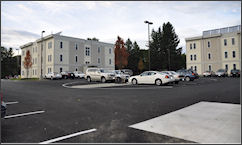As parking guru Donald Shoup has long argued, there is a very high cost to “free” parking. Typically, those costs are hidden, so people are unaware that they exist. While Shoup’s theory is gaining traction among urban planners, particularly the smart growth set, it hasn’t caught on with the general public, possibly because there isn’t much data showing how the cost of parking mandates trickle down to the average Joe.
Now come Jesse London and Clark Williams-Derry with the Sightline Institute with a study of 23 recently completed Seattle-area multifamily housing developments. In “Who Pays for Parking? How the oversupply of parking undermines housing affordability,” the authors found that 37% of parking spots remained empty overnight. That was consistent with another finding that apartment complexes had 20% more occupied apartments than occupied parking spaces, meaning many tenants had no cars. Further, not one project recovered enough in fees to cover the cost of building and maintaining the parking facilities.
Here’s the coup de grace:
Landlords’ losses on parking — calculated as the difference between total parking costs and total parking fees collected from tenants — add up to roughly 15 percent of monthly rents in our sample, or $246 per month for each occupied apartment. Because landlords typically recoup these losses through apartment rents, all tenants — even those who don’t own cars — pay a substantial hidden fee for parking as part of their monthly rents.
Here’s a wild and crazy idea. How about a free market in parking? Why not let apartment owners build as many parking spaces as they think there will be a demand for? Why not let them substitute bicycle parking spaces for automobile parking? Even crazier, how about letting apartment owners de-bundle parking spaces from apartment rents and charge only those tenants who want a space? Hold onto your hats for this one, folks, how about letting landlords build no parking spaces at all if the neighborhood is walkable, there is convenient access to mass transit and they are targeting households that own no cars?
I know it sounds radical, but why not let consumers, not local government officials acting on the basis of often outdated and arbitrary formulas, make their own trade-offs between the cost of rent and the convenience of parking?



